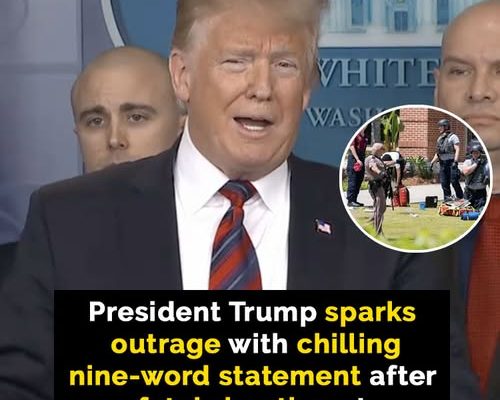In the wake of this tragedy, national attention shifted to the White House, where President Donald Trump addressed the situation in a press conference. His remarks quickly ignited controversy.
“These incidents are horrific,” the president stated, before shifting to reaffirm his strong support for the Second Amendment. “The gun does not pull the trigger; people do,” he asserted. Trump emphasized his long-standing commitment to protecting gun rights, reiterating, “I have a duty to uphold the Second Amendment.”
When pressed for clarification regarding his statement about needing to “see what happens,” he replied, “Only in terms of what occurs regarding legislation; this issue has persisted for a long time.” He further commented, “I am very familiar with the area and the school. We will provide more information later.”
The response to Trump’s comments was immediate and divisive. Critics accused him of minimizing the human toll of the tragedy in favor of advocating for gun rights. One user on X (formerly Twitter) remarked, “’Sorry about the dead people, but I love guns.’ Their ashes are not even cold yet. Completely disgraceful and unchristian.” Another added, “Trump’s reaction to the FSU shooting is heartless; his statement that ‘guns don’t shoot, people do’ overlooks the tragedy and the urgent need for genuine solutions.”
Others highlighted the flawed reasoning in his argument. “Such incidents are rare in countries without guns. All of them have people,” one individual noted, while another bluntly stated, “The gun literally does the shooting. He is a moron.”
Tallahassee Police Chief Lawrence Revell has confirmed that the shooter, Ikner, sustained injuries during the encounter with law enforcement. He has been transported to the hospital with serious, yet non-life-threatening, injuries. The motive for the attack remains unclear, and authorities have not yet disclosed the identities of the victims.
The Florida State University community is now facing the shock and sorrow of yet another violent incident in an environment intended to promote safety, education, and personal development. As vigils commence and families await information, a national dialogue persists regarding the complex issues surrounding gun rights, legislation, and the ongoing trauma associated with school shootings.
Public opinion is sharply divided. Some advocate for swift legislative reforms, while others support the president’s position on constitutional rights. Nevertheless, many continue to pose the same question that has arisen after previous tragedies: how many more lives must be sacrificed before substantial change occurs? As the investigation progresses and families grieve, the political ramifications and emotional impact of this event are likely to resonate well beyond the confines of FSU.



